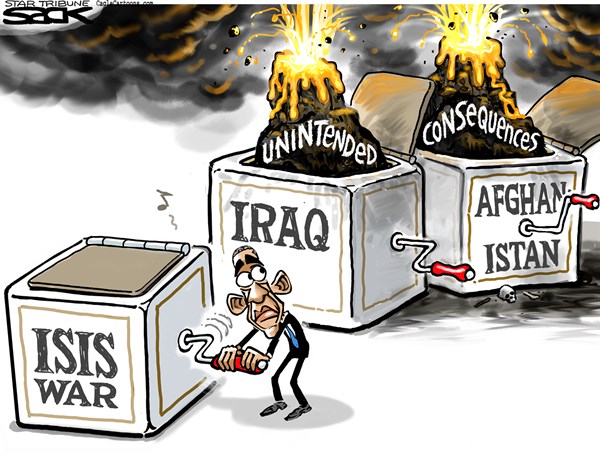
CHICAGO -- The trains still screech on the elevated tracks of the Loop. The crowds still gather along the packed streets outside the iconic popcorn and nut outlets. The sweet-cheese pierogi and the borscht still are crowd favorites in the city's Polish restaurants. Chicago never felt so normal as it did last week.
This is the paradox of our time: The United States is in a war, but Americans aren't at war.
We are speaking, of course, of the American initiative against the Islamic State, different not only from the American conflicts in the two World Wars and the two major Asian wars of the last century, but also different from the American wars in Iraq and Afghanistan of this century. And we are using the word "war" because the Obama administration, in a subtle but important rhetorical adjustment, abruptly substituted "at war" for "counterterrorism" a few days ago.
In the military actions in both Iraq and Afghanistan, the foes -- after the initial engagements -- were rebel groups or terror cells without traditional national status. That, of course, is true with the struggle against the Islamic State. But while American presidents sent American troops onto foreign soil in Iraq and Afghanistan, no American GIs will be on the ground in Syria or in the parts of Iraq occupied by the Islamic State.
None, at least, for now -- unless the situations worsen.
There have been other occasions when the United States was in a war without Americans being at war. That is probably true of the Mexican-American War and the Spanish-American War, but of hardly any other conflict. Those two wars involved American soldiers fighting in isolated locales for relatively short periods of war during which there were limited privations at home and, in fact, little evidence of war at home -- besides, of course, the isolated homes where families mourned their wartime losses.
Not so in almost every other major American military engagement.
The Revolutionary War was fought on the East Coast, and the War of 1812 endangered the ports of New England, the capital at Washington and the Great Lakes region. The Civil War had both military and civilian fronts, especially in the border states and in the South, where the devastation was the most severe.
Both World Wars were such monumental efforts that virtually every family was affected, either by war work or by virtue of having brothers, sisters, fathers or mothers actually deployed abroad or in support roles domestically. The same was true in the conflicts in Korea and Vietnam. Even the so-called Indian wars of the 19th century exposed American civilians, on the frontier at least, to danger and perhaps death, and the target of those military engagements were, by many definitions, Americans.
They might, of course, and that is part of the risk of engagement, and maybe even a greater risk of not engaging. But at least when this column was typed, we are speaking of a fight on a distant continent, which is the way we like our wars. Until terrorist groups intruded, that was the prerogative of a superpower: away games only, no home engagements.
Despite the implicit threat to what is now called the American homeland, the conflicts in the Middle East and central Asia seemed like affairs faraway. On many days, when principally clandestine American forces were at work, they seemed almost like ramped-up analogues to United States involvement in the coups in Iran in 1953 and Guatemala in 1954.
But the terrorist attacks of 2001 changed more than our outlook; they changed our vocabulary as well. Until 2001, that evocative word "homeland" was customarily applied in the Western Hemisphere to the countries of Americans' immigrant forebears, rarely to the United States itself, and it was employed far more in fiction than in fighting. It was more appropriate to the novel "A Tree Grows in Brooklyn" than to the notion that a military commitment was growing in central Asia.
A peculiar case of congressional disengagement only underlined that unsettling quality. Though there were debates and votes on Capitol Hill last week, the lawmakers were dealing with authorization for the training of Syrian rebels. The president still has vast latitude in his fight against the Islamic State, in part because that fight right now seems popular -- and urgent. Even so, a Congress that has held more than 50 votes on Obamacare -- efforts to repeal or de-fund the measure have become routine in the House -- seems uneasy with intruding on White House prerogatives in national security affairs.
That may change after this autumn's midterm congressional elections. But until and unless that happens, congressional uneasiness actually has given the president freer reign, in effect affirming the president's views of what those White House prerogatives are.
There are two ironies here, both with important constitutional implications.
One is that Congress, especially the House, is content to let Obama expand the powers of the presidency even as it seeks in other realms to thwart his will and block his priorities and appointments. One day the House Republicans sue the president for overreaching, another day they expand his reach.
The other is that by inaction or even inattention, Congress seems willing to grant the president broad flexibility in interpreting the authority it has granted earlier.
In another case of Obama leaning on the very pinions of Bush administration policy that he deplored in order to win the White House -- some of the others were in economic affairs -- the president's implicit legal defense of his actions has rested on authorizations Bush won more than a decade ago to battle al-Qaida and invade Iraq.
Those authorizations were far more narrow in reality than they are in memory. But, then again, a sense of unreality cloaks everything about America at war in the 21st century.
David Shribman, a Pulitzer Prize winner in journalism, is executive editor of the Pittsburgh Post-Gazette.
Comment by clicking here.


